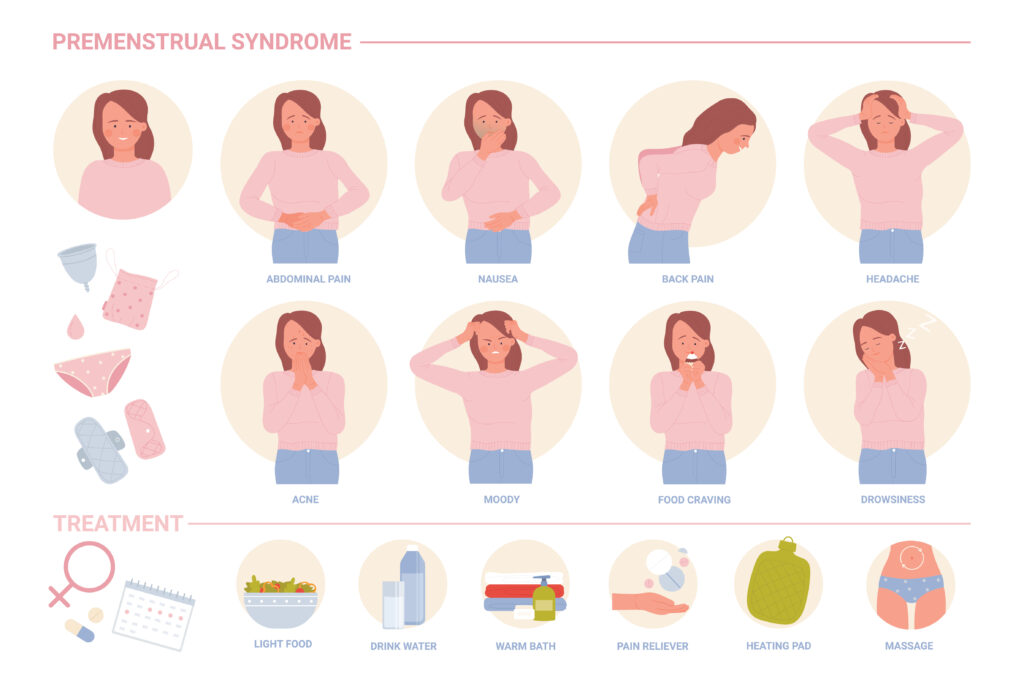Imagine feeling like a different person for nearly half of every month—overwhelmed by mood swings, irritability, and physical discomfort so intense it disrupts your daily life. For many women and individuals assigned female at birth, this is not just “PMS.” It’s something far more severe: Premenstrual Dysphoric Disorder (PMDD).
Affecting up to 5-8% of menstruating individuals, a comprehensive premenstrual dysphoria treatment center in Atlanta, GA, is necessary. PMDD is a serious mental health condition that can impact relationships, work, and overall well-being. Yet, it often goes undiagnosed or misunderstood, leaving women to struggle in silence.
At Thoroughbred Wellness and Recovery, we understand the unique challenges of PMDD. Our team is dedicated to providing compassionate, evidence-based care for guests seeking relief and a path to wellness.
In this article, we’ll explore PMDD, how it differs from PMS, the latest treatment options, and how our center in Georgia can help you reclaim your quality of life.

Understanding PMDD: More Than Just PMS
Premenstrual Dysphoric Disorder is a severe form of premenstrual syndrome (PMS), but the difference is more than just intensity.
While PMS affects up to 75% of menstruating individuals with mild to moderate symptoms, PMDD is a diagnosable mental health disorder characterized by debilitating emotional and physical symptoms that occur in the luteal phase of the menstrual cycle—the week or two before menstruation.
Symptoms of PMDD include:
- Severe mood swings, irritability, or anger
- Feelings of hopelessness or depressive disorder symptoms
- Anxiety or tension
- Marked changes in appetite, including cravings
- Sleep disturbances (insomnia or hypersomnia)
- Physical symptoms such as bloating, breast tenderness, headaches, and joint or muscle pain
- Difficulty concentrating
- Fatigue or low energy
- Loss of interest in daily activities or relationships
These symptoms are cyclical, closely tied to hormonal changes during the menstrual cycle, and can be so severe that they interfere with work, school, and relationships.
PMDD is recognized in the DSM-5 as a mental health disorder, highlighting the need for specialized care and treatment.
PMDD vs. PMS: Recognizing the Difference
It’s common to confuse premenstrual syndrome (PMS) with PMDD, but the distinction is critical for effective treatment.
PMS involves mild to moderate symptoms that do not significantly disrupt daily life. In contrast, PMDD symptoms are severe, persistent, and can lead to suicidal thoughts or behaviors in extreme cases.
Suppose you or a loved one experiences emotional symptoms like intense sadness, anger, or anxiety that recur monthly and interfere with daily functioning. In that case, it’s important to consult a healthcare professional for a thorough evaluation.
Early intervention can make a significant difference in managing symptoms and improving quality of life.
The Science Behind PMDD: Hormonal Fluctuations and Mental Health
The exact cause of PMDD is not fully understood, but research points to an abnormal response to normal hormonal fluctuations during the menstrual cycle.
Estrogen and progesterone levels rise and fall, affecting neurotransmitters like serotonin, which play a crucial role in mood regulation. For those with PMDD, these hormonal changes can trigger significant emotional and physical symptoms.
Recent studies suggest that individuals with PMDD may have increased sensitivity to these hormonal shifts, leading to pronounced mood disorders and physical symptoms.
Sensitivity is not a sign of weakness or lack of willpower—it’s a complex interplay of biology, brain chemistry, and genetics.
PMDD is also linked to other mental health conditions, such as anxiety, depression, and postpartum depression.
Co-occurring disorders can complicate diagnosis and treatment, making it essential to seek care from a healthcare provider experienced in both psychiatry and women’s mental health.

Evidence-Based PMDD Treatment Options
Thoroughbred Wellness and Recovery offers a comprehensive range of PMDD treatment options tailored to each guest’s unique needs. Our approach is rooted in evidence-based modalities, combining medical, psychological, and holistic interventions to address the full spectrum of PMDD symptoms.
Medication Management
Selective Serotonin Reuptake Inhibitors (SSRIs) are the first-line pharmacological treatment for PMDD. These antidepressants, such as fluoxetine, sertraline, and paroxetine, have been shown to reduce both emotional and physical symptoms significantly. Unlike traditional use for depression, SSRIs for PMDD can be taken continuously or only during the luteal phase, depending on the guest’s needs and side effects.
Birth Control Pills and hormonal contraceptives can help stabilize hormonal fluctuations and reduce PMDD symptoms. Certain birth control pills, especially those containing drospirenone, are FDA-approved for PMDD treatment. However, not all women respond the same way, and side effects should be discussed with a healthcare provider.
Hormone Therapy is recommended for guests who do not respond to SSRIs or birth control; hormone therapy may be considered. This can include GnRH agonists, which suppress ovulation and hormonal fluctuations, but these are typically reserved for severe cases due to potential side effects.
Supplements, including Calcium supplements (1,200 mg daily), have been shown in clinical trials to reduce physical symptoms like bloating and breast tenderness. Other supplements, such as magnesium and vitamin B6, may offer additional relief, but should be used under the guidance of a healthcare professional to avoid adverse effects.
Psychotherapy and Counseling
Cognitive Behavioral Therapy (CBT) is a highly effective, evidence-based intervention for PMDD. It helps guests identify and challenge negative thought patterns, develop coping strategies, and manage stress. CBT can be delivered individually or in group therapy settings, providing support and connection with others facing similar challenges.
Psychotherapy, including talk therapy, offers a safe space to explore emotional symptoms, relationship issues, and co-occurring disorders. Support groups, whether in-person or online, can reduce feelings of isolation and provide practical advice for managing daily life with PMDD.
Lifestyle and Wellness Interventions
Stress Management: Chronic stress can exacerbate PMDD symptoms. Techniques such as mindfulness, yoga, meditation, and deep breathing exercises are integrated into our treatment plans to promote relaxation and emotional balance.
Nutrition and Exercise: A balanced diet of whole grains, lean proteins, and fresh fruits and vegetables can help stabilize mood and energy levels. Regular physical activity, even moderate exercise like walking or swimming, has been shown to reduce symptoms of depression and anxiety associated with PMDD.
Sleep Hygiene: Establishing a consistent sleep routine and creating a restful environment can improve sleep quality, which is often disrupted by PMDD.
Outpatient Care and Personalized Treatment Plans
Our outpatient treatment centers in midtown Marietta and Cartersville, Georgia, offer flexible, personalized care for guests with PMDD. We recognize that every guest’s experience is unique, and our team—including psychiatrists, therapists, and wellness coaches—works collaboratively to develop individualized treatment plans.
Treatment plans may include medication management, psychotherapy, group therapy, and holistic wellness interventions. We also provide education and support for loved ones, recognizing the impact PMDD can have on families and relationships.
For guests with co-occurring mental health disorders, such as anxiety or depressive disorder, our integrated approach ensures that all aspects of mental health are addressed. This comprehensive care model supports long-term recovery and improved quality of life.
The Importance of Seeking Professional Help
PMDD is a serious mental health condition that requires professional intervention. Left untreated, it can lead to significant impairment in daily life, increased risk of self-harm, and worsening of other mental health disorders. Early diagnosis and evidence-based treatment can dramatically improve outcomes and restore hope.
If you or a loved one is struggling with symptoms of PMDD, don’t wait to seek help. A healthcare provider specializing in mental health care can provide a thorough assessment, rule out other conditions, and develop a tailored treatment plan.

Why Choose Thoroughbred Wellness and Recovery?
At Thoroughbred Wellness and Recovery, we are committed to providing compassionate, expert care for guests with PMDD and other mood disorders. Our centers offer a welcoming, supportive environment where guests can access the latest treatment options and holistic wellness services.
We believe in empowering our guests to take charge of their mental health and well-being. Our team stays current with the latest research and best practices in psychiatry, behavioral health, and women’s mental health, ensuring that every guest receives the highest standard of care.
Our services include:
- Comprehensive psychiatric evaluation and diagnosis
- Medication management, including SSRIs and hormone therapy
- Individual and group therapy, including CBT and talk therapy
- Holistic wellness programs, including nutrition, exercise, and stress management
- Support for co-occurring disorders and family education
Embrace Wellness Today
Living with PMDD can feel overwhelming, but you don’t have to face it alone. At Thoroughbred Wellness and Recovery, we are here to support you every step of the way. Our compassionate team is dedicated to helping guests find relief, restore balance, and reclaim their quality of life.
If you’re ready to explore your treatment options or want to learn more about our evidence-based approach to PMDD and mental health care, call us today at 770-564-4856. Your journey to wellness starts with a single step—reach out and let us help you thrive.









